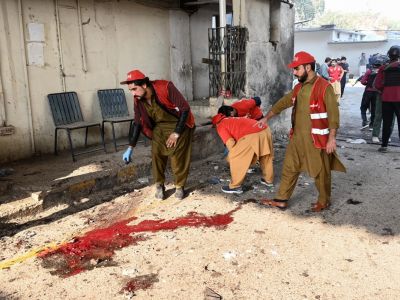A Palestinian man was killed early Tuesday morning during a battle between resistance fighters and Israeli occupation troops who seized "dominant positions" in the autonomous Palestinian town of Beit Jala.
AFP and Haaretz newspaper identified the Palestinian as Mohammad Samur, 23. He died about an hour after being hit in the chest during the attack.
Two more Palestinians, one of them a journalist, were lightly wounded, medical sources told AFP.
At the same time, Israeli tanks and bulldozers attacked areas in the Gaza Strip, destroying houses and leaving four Palestinians wounded, Palestinian security sources said.
Beit Jala stands opposite the key Jewish settlement of Gilo, where one Israeli was slightly wounded by Palestinian fire earlier Monday.
Beit Jala is on the outskirts of the West Bank town of Bethlehem, and the Israeli army said it moved in, shortly after midnight, following gunfire there.
"Our forces have occupied dominant positions in Beit Jala and will maintain a presence there to prevent further firing," an army spokesman said in a statement, cited by Haaretz.
"Our forces will operate for a limited time to achieve their objectives," the statement said.
The army's aim was to "protect innocent civilians and foreign residents as well as the holy sites," in Bethlehem, the statement continued.
AFP's latest tally of those killed in the Palestinian uprising against 34 years of Israeli military occupation stands at 572 Palestinians and 154 Israelis, a ratio of around four to one. Israeli troops, according to Amnesty International, have shot dead about 100 children.
The Palestine Red Crescent Society, meanwhile, reports well over 15,000 Palestinians wounded.
An Israeli army spokeswoman later told AFP that, "as soon as the Palestinians stop firing at us, we will leave" Beit Jala.
Haaretz said that Israeli Prime Minister Ariel Sharon was expected to convene the security cabinet Tuesday to discuss whether to maintain Israel's presence in Beit Jala or to withdraw the troops now positioned there.
Israel Radio quoted a senior diplomatic source Tuesday saying it was unlikely that the forces would withdraw in the next day.
According to the paper, the political echelon authorized the strike Monday evening, with Foreign Minister Shimon Peres the only dissenter.
Peres opposed the operation, saying that the way to halt the shooting at Gilo was by talking to Palestinian President Yasser Arafat, Israel Radio reported.
Senior diplomatic sources estimated that this attack and occupation would last longer than similar assaults carried out in Hebron last week and Jenin two weeks ago, in which troops invaded the Palestinian-controlled towns for several hours and then withdrew. One source said it was possible that the army would stay in Beit Jala, "for several hours, possibly even several days."
Israeli Justice Minister Meir Sheetrit said Tuesday the army would "stay in Beit Jala as long as is needed," according to Haaretz.
"If the shooting at Gilo continues," he added, "we will seize the whole town if necessary."
There had been sporadic but heavy gunfire as dawn approached, said an AFP correspondent at the scene, who reported having heard at least 10 Israeli tanks shells explode over the previous two and a half hours.
About 500 meters (yards) from the Israeli positions, five Palestinian policemen armed with assault rifles ran past, disappearing into side streets and gardens heading in the direction of those positions, he reported.
At another moment, a Palestinian, armed with a bazooka, ran out of the Bethlehem Hospital forecourt and about 50 meters (yards) down the road, firing the weapon, before returning to the hospital.
By 7:00am, shooting was less frequent, and only small-arms fire could be heard, AFP added.
Meanwhile, Israeli troops and tanks also forced their way into an autonomous Palestinian area in the Gaza Strip overnight after a day of bloodshed and a warning of the prospect of "all-out war."
The exchanges of fire and attacks around Bethlehem came just hours after Israel assassinated the secretary general of the Popular Front for the Liberation of Palestine (PFLP), Abu Ali Mustapha, in an attack that the PA said marked the end of peace hopes and the beginning of "all-out war."
The killing of Mustapha was quickly followed by the murder of a Jewish settler in a revenge attack, said reports.
Israeli parachutists, protected by three tanks and armored cars, first penetrated the village of Rahmeh, in Bethlehem's autonomous eastern sector, after breaking through Palestinian barriers, witnesses told AFP.
Israeli helicopters circled the area while in the Palestinian refugee camps in the area, militants used loudspeakers to call for armed resistance against the Israeli forces.
Meanwhile, in the southern Gaza Strip, four Israeli bulldozers, accompanied by tanks, advanced 100 meters (yards) into the Rafah zone, destroying at least three Palestinian homes, sources said.
This second incursion left four Palestinians wounded, including a woman who was seriously hurt by a tank shell, they told AFP.
The clashes followed repeated attacks against Israeli positions near the Egyptian border during which 20 grenades were launched at Israeli troops Monday, according to a military source – Albawaba.com
© 2001 Al Bawaba (www.albawaba.com)









